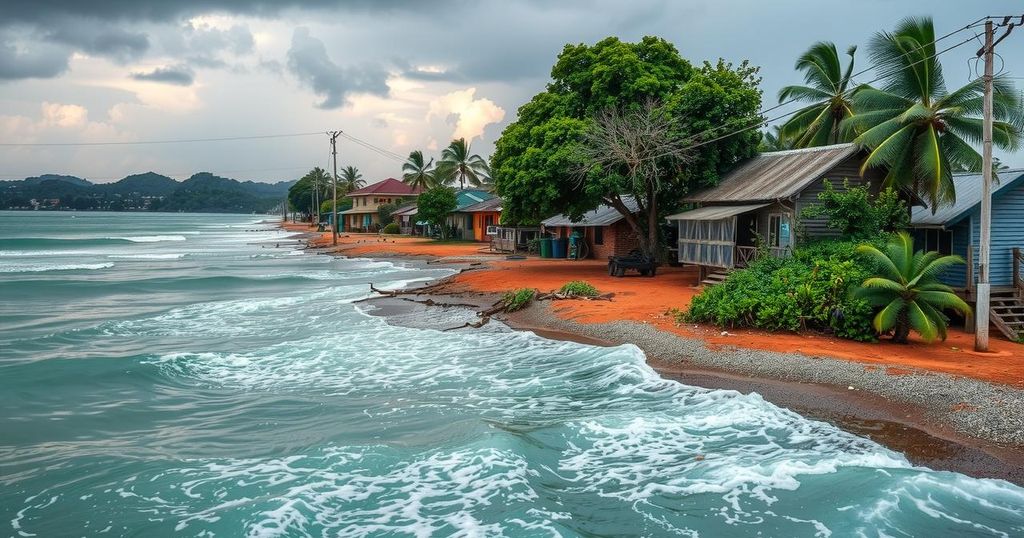Cyclone Chido has caused widespread devastation in Mozambique, displacing thousands and exacerbating existing climate challenges in the region. The cyclone is part of a disturbing trend of increasingly severe weather patterns in Southern Africa, linked to climate change. Authorities emphasize the need for improved preparedness and international support to bolster resilience against future climate-related disasters.
The recent devastation caused by Cyclone Chido in northern Mozambique has compounded the already dire climate challenges facing the region. The cyclone, which made landfall on December 15, 2024, has resulted in the displacement of thousands in the Cabo Delgado and Nampula provinces. This storm is part of a disturbing trend of increasingly severe weather patterns in Southern Africa, exacerbated by climate change. Experts assert that rising global temperatures are contributing to more frequent and intense cyclones in the Indian Ocean, leading to widespread disruption and humanitarian crises.
In the wake of Cyclone Chido, the humanitarian response has been swift, but the needs are overwhelming. Heavy rainfall and winds reaching 260 km/h (160 mph) have caused significant destruction, including loss of life, damage to infrastructure, and threats to sanitation, particularly among vulnerable populations. Organizations such as UNICEF are already raising alarms regarding potential long-term effects, such as interrupted education and increased risks of waterborne diseases. The cyclone has also highlighted the precarious situation that Malawi and Mozambique find themselves in, as they recover from recent cyclonic events like Cyclone Freddy, Gombe, and Idai.
Despite the disaster, preliminary assessments reveal that both countries have improved their preparedness for such events. In Malawi, there has been a notable enhancement in inter-institutional coordination, essential for effective disaster response. The Malawian government took preventive measures by securing food and relief supplies prior to Cyclone Chido’s arrival, reflecting a growing recognition of the need for ongoing resilience-building efforts. However, the scale of damage from Cyclone Chido is still being evaluated, and recovery remains a pressing concern as both nations grapple with the cumulative effects of climate crises.
Experts insist that future strategies must include sustainable relocation of communities at risk, investments in resilient infrastructure, and adaptation of agricultural practices. The emphasis placed on proactive planning could help mitigate the adverse effects of cyclones before they occur. As climate change continues to escalate the frequency and intensity of such storms, the call for enhanced international support to bolster regional resilience and tackle root causes of global warming becomes increasingly urgent. As highlighted by local authorities, the lessons learned from each cyclone must inform better recovery and readiness plans, ensuring that communities emerge stronger amidst recurring adversities.
The article discusses the increasing frequency and severity of cyclones impacting Southern Africa, particularly Mozambique and Malawi. Recent storms, including Cyclone Chido, are linked to the broader consequences of climate change, which has resulted in rising ocean temperatures conducive to cyclone formation. The humanitarian ramifications of these storms are profound, as communities struggle with displacement, infrastructure damage, and public health risks. Amidst these challenges, efforts to enhance preparedness and response mechanisms are underway, with a recognition that proactive measures can significantly reduce vulnerability to future cyclonic events.
In summary, Mozambique and Malawi face severe environmental challenges due to the escalating frequency of cyclones, driven by climate change. Cyclone Chido has underscored the urgent need for effective disaster preparedness and response strategies. Local authorities stress the importance of learning from past experiences to build safer and more resilient communities. The long-term outlook requires robust international assistance to address both immediate humanitarian needs and the enduring impacts of climate change on regional stability and food security.
Original Source: www.dw.com






